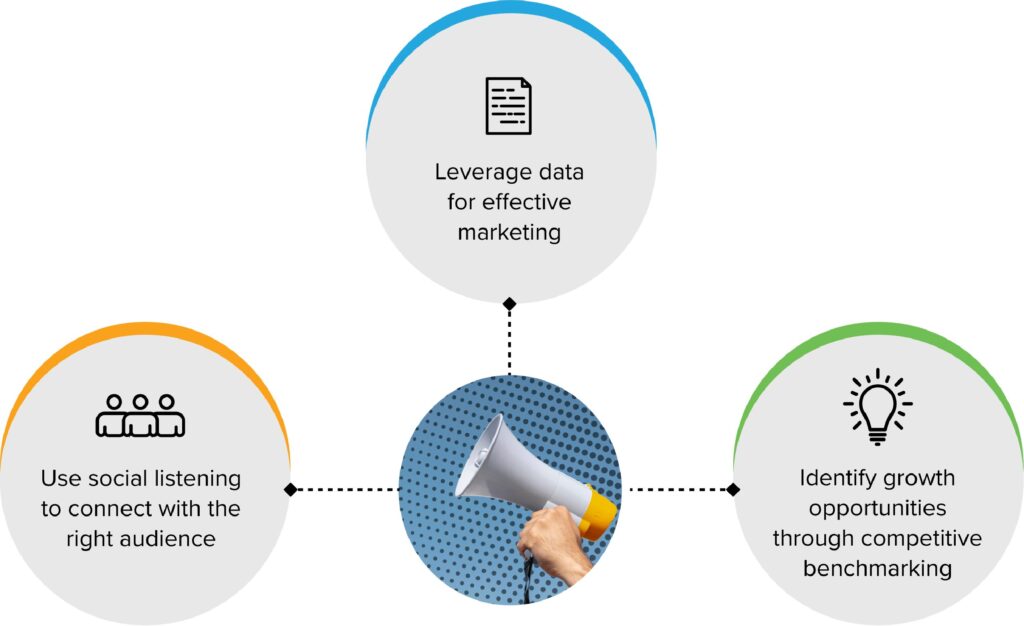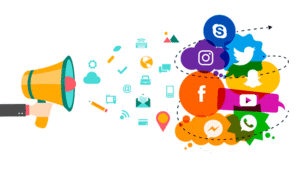Social media analytics is a powerful tool for enhancing your social media strategy. By carefully tracking and analyzing data, you can gain valuable insights into audience behavior, content performance, and overall engagement, allowing you to make informed decisions and optimize your approach.
1. Understanding Your Audience
The first step in improving your social media strategy through analytics is to understand your audience. Platforms like Facebook, Instagram, and Twitter offer detailed demographic insights, such as age, gender, location, and interests. By analyzing this data, you can tailor your content to better meet the needs and preferences of your audience. For example, if you find that a significant portion of your followers are young adults interested in technology, you can create content that resonates with that demographic, increasing engagement and fostering loyalty.

2. Content Performance Analysis
Analyzing the performance of your content is crucial for refining your strategy. Social media analytics tools provide metrics such as likes, shares, comments, and click-through rates, allowing you to determine which types of content resonate most with your audience. For instance, if video posts consistently outperform image posts, you might consider increasing your video content production. Additionally, by tracking the times and days when your content receives the most engagement, you can schedule your posts for optimal visibility.

3. Measuring Engagement and Reach
Engagement and reach are key indicators of your social media success. Engagement refers to the interactions your content receives, while reach measures how many people have seen your content. By monitoring these metrics, you can assess the effectiveness of your posts and identify trends. For example, if your engagement rate is high but your reach is low, you might focus on strategies to increase your audience size, such as paid promotions or partnerships with influencers.

4. Identifying and Leveraging Trends
Social media trends can significantly impact your strategy. By staying informed about trending topics, hashtags, and challenges, you can create content that taps into current conversations, increasing your visibility and relevance. Analytics tools can help you track these trends and identify opportunities for your brand to participate in meaningful ways. For instance, if a particular hashtag related to your industry is gaining traction, you can incorporate it into your posts to reach a broader audience.

Also Read: The Significance of Content Calendars in Modern Marketing Strategies
5. Optimizing Paid Campaigns
For businesses that invest in paid social media campaigns, analytics is essential for maximizing return on investment (ROI). By tracking the performance of your ads, you can determine which campaigns are driving the most traffic, conversions, or sales. Analytics tools allow you to monitor key metrics such as cost-per-click (CPC), conversion rates, and return on ad spend (ROAS). With this data, you can adjust your targeting, creative, and bidding strategies to improve the effectiveness of your campaigns.

6. Improving Customer Engagement
Social media analytics also provides insights into customer engagement and satisfaction. By monitoring comments, messages, and reviews, you can gauge how your audience perceives your brand and products. Positive feedback can be amplified through testimonials and case studies, while negative feedback can be addressed promptly to improve customer satisfaction. Additionally, sentiment analysis tools can help you understand the overall tone of conversations around your brand, allowing you to make data-driven decisions to enhance your reputation.
7. Tracking Competitor Performance
Understanding your competitors’ social media strategies is another valuable use of analytics. By analyzing their engagement rates, content types, and posting frequency, you can identify gaps in your strategy and discover new opportunities. For example, if a competitor’s posts consistently receive high engagement, you can study their approach and adapt it to your own content. Many social media analytics tools also offer competitive benchmarking features, allowing you to compare your performance directly with that of your competitors.
8. Setting and Monitoring Goals
Finally, analytics helps you set and track your social media goals. Whether your objective is to increase brand awareness, drive website traffic, or boost sales, analytics provides the data needed to measure your progress. By setting specific, measurable, achievable, relevant, and time-bound (SMART) goals, you can use analytics to monitor your performance and make adjustments as needed. For example, if your goal is to increase your follower count by 20% in three months, you can track your progress using analytics tools and implement strategies to accelerate growth if necessary.
Conclusion
In conclusion, social media analytics is a powerful resource for improving your social media strategy. By understanding your audience, analyzing content performance, measuring engagement, identifying trends, optimizing campaigns, improving customer engagement, tracking competitors, and setting clear goals, you can make data-driven decisions that enhance your social media presence and achieve your business objectives. As social media continues to evolve, staying informed and leveraging analytics will be key to staying ahead of the competition and maximizing your success.

The Golden Circle of Content Marketing
Views: 131 Content marketing has become an indispensable strategy for businesses aiming to connect with their target audience, build brand loyalty, and drive conversions. Yet,

Why Every Realtor Needs a Digital Marketing Plan for Real Estate
Views: 138 The real estate industry is undergoing a significant transformation, driven by digital marketing plan and changing consumer behavior. Gone are the days when

Effective Use of Hashtags to Increase Your Social Media Reach
Views: 163 In today’s digital age, social media has become a powerful tool for individuals and businesses alike. With billions of users actively engaging on

The Importance of Authenticity in Social Media Marketing
Views: 195 In today’s digital age, social media has become a crucial platform for brands and businesses to connect with their audience. However, with the

The Impact of Visuals in Social Media Marketing
Views: 176 In the digital age, social media marketing has emerged as one of the most powerful tools for brands to connect with their audience.

The Role of AI in Social Media Content Creation
Views: 198 In today’s digital landscape, social media has become an essential platform for brands, businesses, and individuals to connect with their audiences. As the




